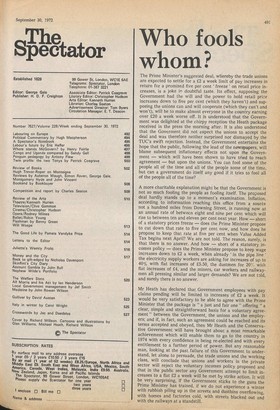Who fools whom?
The Prime Minister's suggested deal, whereby the trade unions are expected to settle for a £2 a week limit of pay increases in return for a promised five per cent 'freeze ' on retail price increases, is a joke in doubtful taste. Its effect, supposing the Government had the will and the power to hold retail price increases down to five per cent (which they haven't) and supposing the unions can and will cooperate (which they can't and won't), will be to make almost everyone in the country earning over £20 a week worse off. It is understood that the Government was delighted at the chirpy reception the Heath package received in the press the morning after. It is also understood that the Goverment did not expect the unions to accept the deal and was therefore neither surprised nor dismayed by the TUC's swift rejection. Instead, the Government entertains the hope that the public, following the lead of the newspapers, will blame subsequent inflationary effects not upon the Government — which will have been shown to have tied to reach agreement — but upon the unions. You can fool some of the people all of the time and all of the people some of the time, but can a government do itself any good if it tries to fool all of the people all of the time?
A more charitable explanation might be that the Government is not so much fooling the people as fooling itself. The proposed deal hardly stands up to a moment's examination. Inflation, according to information reaching this office from a source not a hundred miles from Downing Street, is running now at an annual rate of between eight and nine per cent which will rise to between ten and eleven per cent next year. How — short of a statutory prices freeze — does the Prime Minister propose to cut down that rate to five per cent now, and how does he propose to keep that rate at five per cent when Value Added Tax begins next April? We are not told. The reason, surely, is that there is no answer. And how — short of a statutory incomes policy — does the Prime Minister propose to keep wage increases down to £2 a week, when already 'in the pipe line ' the electricity supply workers are asking for increases of up to 40% with flat increases of £5.50, the dustmen for 20*/ with flat increases of £4, and the miners, car workers and railwaymen all pressing similar and larger demands? We are not told, and surely there is no answer.
Mr Heath has declared that Government employees with pay claims pending will be limited to increases of £2 a week. It would be very satisfactory to be able to agree with the Prime Minister that the package is " a just and fair one " offering " a clear, simple and straightforward basis for a voluntary agreement" between the Government, the unions and the employers; and if, in fact, such an agreement could be reached and its terms accepted and obeyed, then Mr Heath and the Conservative Government will have brought about a most remarkable achievement which will enable them to go to the country in 1974 with every confidence in being re-elected and with every entitlement to a further period of power. But any reasonable man, looking at the past failure of this Government to understand, let alone to persuade, the trade unions and the working class, will conclude that unions and workers in the private sector will reject the voluntary incomes policy proposed and that in the public sector any Government attempt to limit increases to a flat £2 a week will be met by strike action. It will be very surprising, if the Government sticks to the guns the Prime Minister has trained, if we do not experience a winter with rubbish piling up in the streets and dustbins overflowing, with homes and factories cold, with streets blacked out and with the railways at a standstill.










































 Previous page
Previous page